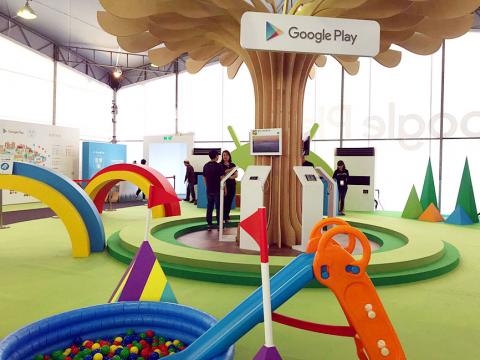Google Inc yesterday launched Google Play Town in Taiwan, a pop-up store that offers online game developers the opportunity to increase the exposure of their mobile games.
“This is the first time Google has ever done it. We decided to do it here because Taiwan is such an important gaming market to us,” Google Asia Pacific head of marketing Simon Kahn told reporters on the sidelines of the launch event.
Citing Google’s internal statistics, Kahn said that over three-quarters of Taiwanese have smartphones, which is one of the highest smartphone penetration rates in the world.

Photo: CNA
“Taiwanese spend an average of 80 minutes a day playing mobile games on a smartphones, so it is an important market to us,” Kahn said.
Google Asia-Pacific president Karim Temsamani said the number of Taiwanese developers registered on Google Play has more than doubled in the past two years.
The spending on Taiwanese apps outside of the nation also increased more than 2.5 times in the past year, Temsamani said, without disclosing figures.
“Taiwan is shaping Google’s mobile strategy. We want to help the nation’s developers get into the global market via Google Play and that’s why we launched Google Play Town,” Temsamani said.
“Google Play Town gives game developers face-to-face feedback from users. It also gives users a different gaming experience,” Google Taiwan marketing manager Richard Li (利啟正) said.
Li said that Taiwan’s game developers have innovative ideas, but they need to invest more in marketing to increase their exposure in the mobile gaming market.
“We encourage developers to join Google Play’s platform as we have more marketing resources to help them,” Li said.
The 100-ping (3306m2) Google Play Town is to officially open tomorrow in front of Taipei 101. The event, featuring more than 70 games, closes on Dec. 13.

SEMICONDUCTORS: The German laser and plasma generator company will expand its local services as its specialized offerings support Taiwan’s semiconductor industries Trumpf SE + Co KG, a global leader in supplying laser technology and plasma generators used in chip production, is expanding its investments in Taiwan in an effort to deeply integrate into the global semiconductor supply chain in the pursuit of growth. The company, headquartered in Ditzingen, Germany, has invested significantly in a newly inaugurated regional technical center for plasma generators in Taoyuan, its latest expansion in Taiwan after being engaged in various industries for more than 25 years. The center, the first of its kind Trumpf built outside Germany, aims to serve customers from Taiwan, Japan, Southeast Asia and South Korea,

Gasoline and diesel prices at domestic fuel stations are to fall NT$0.2 per liter this week, down for a second consecutive week, CPC Corp, Taiwan (台灣中油) and Formosa Petrochemical Corp (台塑石化) announced yesterday. Effective today, gasoline prices at CPC and Formosa stations are to drop to NT$26.4, NT$27.9 and NT$29.9 per liter for 92, 95 and 98-octane unleaded gasoline respectively, the companies said in separate statements. The price of premium diesel is to fall to NT$24.8 per liter at CPC stations and NT$24.6 at Formosa pumps, they said. The price adjustments came even as international crude oil prices rose last week, as traders

SIZE MATTERS: TSMC started phasing out 8-inch wafer production last year, while Samsung is more aggressively retiring 8-inch capacity, TrendForce said Chipmakers are expected to raise prices of 8-inch wafers by up to 20 percent this year on concern over supply constraints as major contract chipmakers Taiwan Semiconductor Manufacturing Co (TSMC, 台積電) and Samsung Electronics Co gradually retire less advanced wafer capacity, TrendForce Corp (集邦科技) said yesterday. It is the first significant across-the-board price hike since a global semiconductor correction in 2023, the Taipei-based market researcher said in a report. Global 8-inch wafer capacity slid 0.3 percent year-on-year last year, although 8-inch wafer prices still hovered at relatively stable levels throughout the year, TrendForce said. The downward trend is expected to continue this year,

POWERING UP: PSUs for AI servers made up about 50% of Delta’s total server PSU revenue during the first three quarters of last year, the company said Power supply and electronic components maker Delta Electronics Inc (台達電) reported record-high revenue of NT$161.61 billion (US$5.11 billion) for last quarter and said it remains positive about this quarter. Last quarter’s figure was up 7.6 percent from the previous quarter and 41.51 percent higher than a year earlier, and largely in line with Yuanta Securities Investment Consulting Co’s (元大投顧) forecast of NT$160 billion. Delta’s annual revenue last year rose 31.76 percent year-on-year to NT$554.89 billion, also a record high for the company. Its strong performance reflected continued demand for high-performance power solutions and advanced liquid-cooling products used in artificial intelligence (AI) data centers,